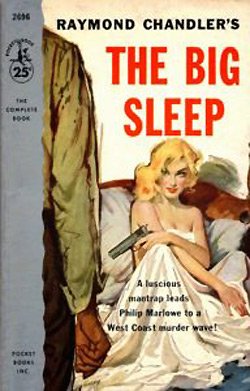Literary Hub republishes the original New York Times reviews of three Ray Chandler mystery novels.
Isaac Anderson, The New York Times, February 12, 1939:
Most of the characters in this story are tough, many of them are nasty and some of them are both. Philip Marlowe, the private detective who is both the narrator and the chief character, is hard: he has to be hard to cope with the slimy racketeers who are preying on the Sternwood family. Nor do the Sternwoods themselves, particularly the two daughters, respond to gentle treatment. Spoiled is much too mild a term to describe these two young women. Marlowe is working for $25 a day and expenses and he earns every cent of it. Indeed, because of his loyalty to his employer, he passes up golden opportunities to make much more. Before the story is done Marlowe just misses being an eyewitness to two murders and by an even narrower margin misses being a victim. The language used in this book is often vile, at times so filthy that the publishers have been compelled to resort to the dash, a device seldom employed in these unsqueamish days. As a study in depravity, the story is excellent, with Marlowe standing out as almost the only fundamentally decent person in it.â€






Jerry The Geek
iNTERESTING retro view of the oh-so-nice bowlderizing of the pre-50’s era.
Frankly, I thought the Bogart version was as good as a hollywood make-over was likely to ever provide.
interview Questions
interview Questions
Never Yet Melted » “Dead Men Are Heavier Than Broken Hearts”
Please Leave a Comment!